Aug. 28 to Sept. 3
Chen Shu-chu (陳樹菊) had never heard of Time magazine when it named her as one of its 100 most influential people of 2010. It was director Ang Lee (李安) who recommended her — though she also had no idea who he was.
“I never understood why they chose me,” the noted philanthropist states in her 2011 biography, Sensational Kindness (不凡的慷慨) by Liu Yung-yi (劉永毅). “I’m just a regular, insignificant vegetable vendor ... There are countless people who are more famous than me, and who have donated 10, 20 or even 100 times more money than me.”
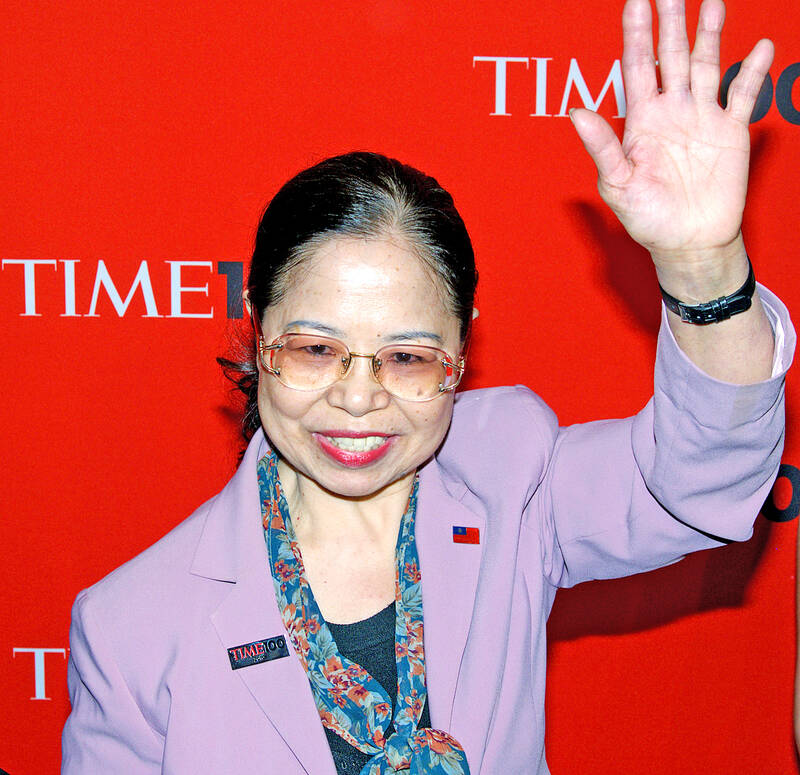
Photo courtesy of David Shankbone
Overcoming a destitute childhood where she was forced to quit school at the age of 13 to sell vegetables while taking care of five siblings, Chen initially just wanted to silently pay forward the kindness that she received over the years. But after the Liberty Times (Taipei Times’ sister paper) uncovered her deeds around 2005, her profile blew up.
“I never told anyone about what I was doing because it was my personal business,” she says. “All of a sudden, everybody knows.”
Chen retired in 2018 due to poor health after more than 50 years running her stall in Taitung’s Central Market, but she continued to give to society. To honor her mother who died giving birth to her younger brother, she donated NT$15 million in 2021 to help pregnant women in need and support children who have lost their mothers in childbirth.
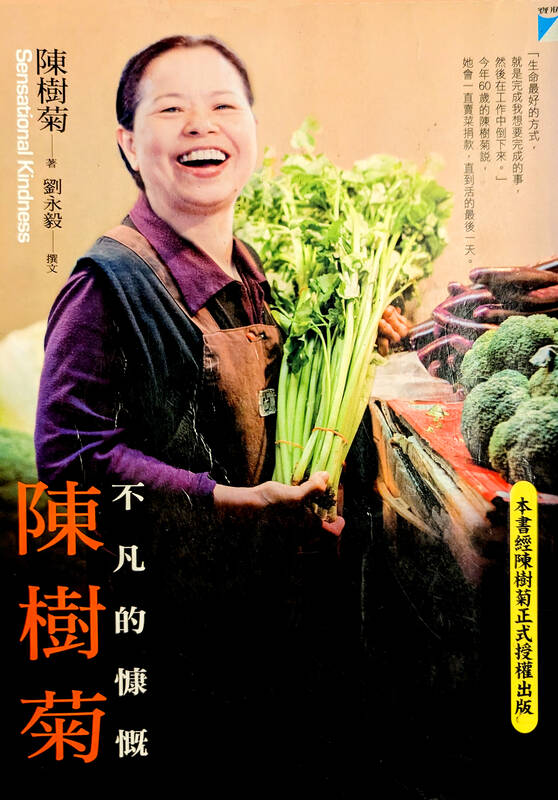
Photo courtesy of Taipei Public Library
In addition to numerous honors and awards, Asteroid 278986, discovered at Nantou’s Lulin Observatory in 2008, was named after her in 2018.
FAMILY TRAGEDIES
Born in Yunlin County, Chen moved with her family to Taitung when she was seven years old. The family of six rented a thatched hut in their new home and sold vegetables for a living. Two more children were born in the next five years. Although they didn’t have much, Chen’s life was relatively worry-free until she graduated from primary school. Things even seemed to look up, as the family won a lot drawing for the most coveted stall in the newly completed Taitung Central Market.
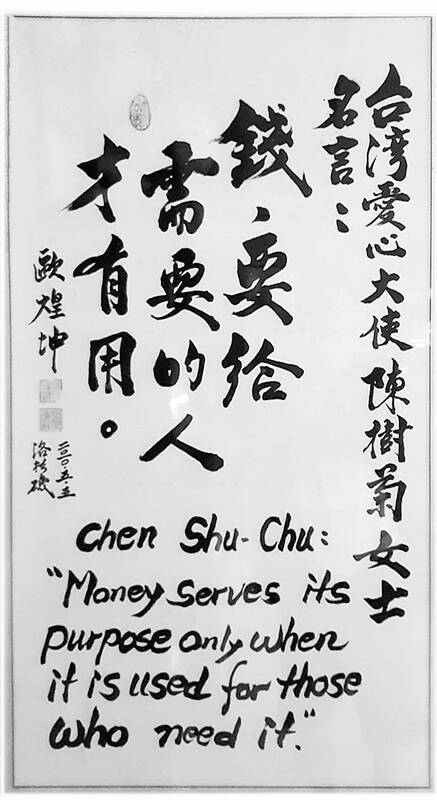
Photo: Huang Ming-tang, Taipei Times
But Chen’s mother just managed the stall for a few weeks before she died giving birth to her seventh child. Since the baby was too large, the birth required a C-section, which the family could not afford. By the time her father managed to borrow enough cash, it was too late.
This tragedy dashed Chen’s plans of attending junior high school, and she began working at the family’s vegetable stall and helping raise her siblings. Money was tight and it became her daily task to figure out how to use what they had to feed everyone, even if it meant that she didn’t get to eat.
The family’s misfortune continued, when one her younger brothers fell ill at the age of 11. The local doctors could not diagnose his sickness and recommended they take him to National Taiwan University Hospital. Her father failed to borrow money from relatives, and finally the brother’s teacher saved them by launching a schoolwide fundraising campaign. Chen’s brother didn’t make it in the end, but this event planted the seeds of philanthropy in her heart.
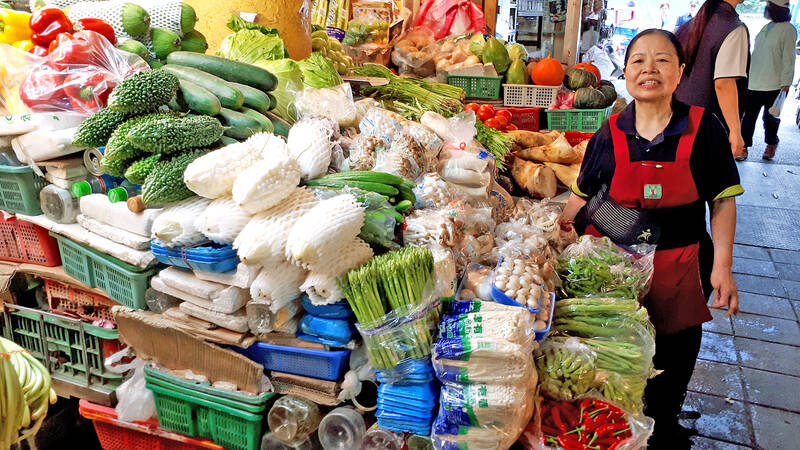
Photo: Huang Ming-tang, Taipei Times
BOOMING BUSINESS
After her brother’s death, Chen was determined to make as much money as she could so the family would never be unable to pay for medical treatment again.
She made changes to the business model and worked grueling hours, often being the first to arrive and last to leave the market and taking just one day off per year. She developed the habit of sleeping on the floor so she would wake up early, and even when she traveled to the US to receive her honors she still slept on the floor at the hotel.
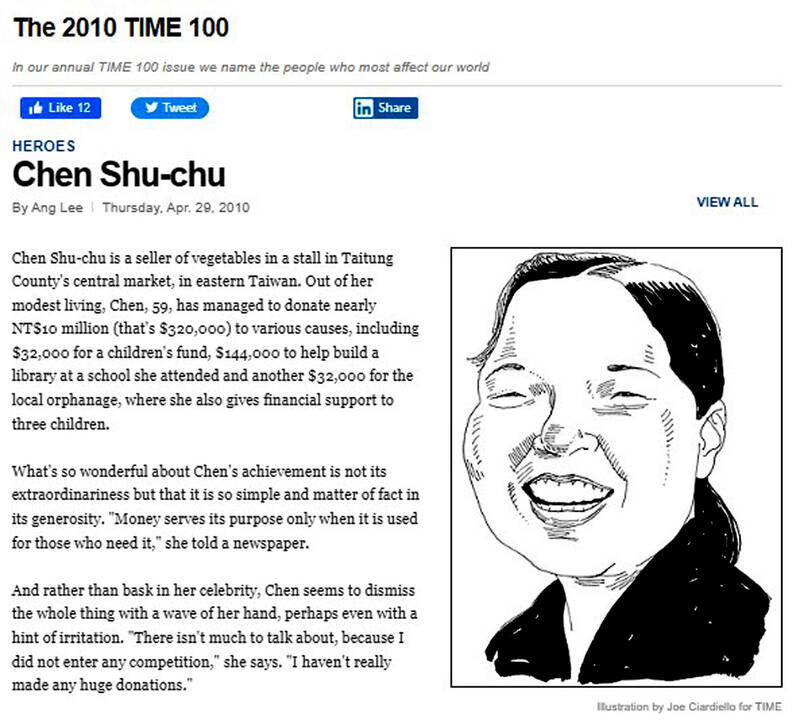
With her business acumen, Chen put her siblings through high school and university. She had put aside some extra cash to buy some nice clothes and eat a fancy meal, but she found that she had little desire for material comforts. Her savings grew.
Whenever people asked why she worked so late, however, Chen answered that there was nobody to go home to anyway. She was about to marry her first boyfriend when her father asked if they could delay the wedding until her siblings were older. He agreed, but a week later he married someone else.
“I lost faith and interest in marriage after that,” she says.
A fortune teller told her she would have three children, however, and when Chen bought a house she kept three extra rooms for them. They remained empty. But she also practically raised her three nephews.
Chen’s business received a major boost when troops from Green Island realized that it was cheaper to buy from her than to have vegetables shipped there. Through investing her savings, she achieved considerable financial security.
Accustomed to living frugally, Chen found that she had little use for the money herself. Despite developing all sorts of health problems, she continued to toil at the market.
“I just saw my physical pains as debts I had to pay back in this life,” the devout Buddhist said. “I believe that when I no longer owe anyone and nobody owes me, then everything will resolve itself. Plus, I still have a mission to complete, so before that, no matter how much I am suffering, I will clench my teeth and carry on.”
HAPPINESS IN GIVING
Chen’s surviving siblings had started their own families and lived comfortably, so she believed that she had fulfilled her duty. She didn’t want her wealth to cause any family disputes, so she declared early on that they wouldn’t receive any of it.
“I might as well give the money to people who actually need it,” she says.
Shortly after her father’s death in the early 1990s, Chen donated NT$1 million to Fo Guang Shan monastery. But after seeing some monks behaving blasphemously, she decided to give directly to the needy. In 1996, she started sponsoring kids annually at the Kids Alive children’s home in Taitung, and later gave the organization NT$1 million.
For a long time, Chen could not sleep well. She often stayed up crying while her thoughts raced, and when she felt especially lonely she would go weep at her mother’s grave in the middle of the night. This changed when she began helping children.
“Every time I saw those children’s smiles, my heart opened up. From within came an indescribable, rich happiness, and from then on I was always able to sleep deeply and soundly,” she says. “I’m glad that money can bring such wonderful feelings. I never wanted anything back for my deeds. Being able to sleep well is the best reward.”
To thank Jen-ai Elementary School (仁愛國小) for raising funds for her sick brother back in the day, she gave NT$550,000 to help students in crisis and to build a library.
It was through this library donation that Liberty Times reporter Huang Ming-tang (黃明堂) learned of Chen’s name and found out about her philanthropy. Chen refused to be interviewed at first, but eventually relented and her story made the front page in 2009.
One day, a particularly large media scrum showed up at her stall — it turns out she was named one of 48 “heroes of philanthropy” by Forbes magazine. She barely had time to digest the news when they showed up again two days later for Time magazine’s selection.
The government urged her to go to the US to receive the award. After much prodding, Chen reluctantly went. She finally had a chance to wear for the first time some of the nice clothes she had bought years previously.
Despite becoming a local celebrity, she could only think of going back to work so she could make more money to give away. She didn’t even take a day off after returning home, showing up at her vegetable stall the next day.
Taiwan in Time, a column about Taiwan’s history that is published every Sunday, spotlights important or interesting events around the nation that either have anniversaries this week or are tied to current events.

April 14 to April 20 In March 1947, Sising Katadrepan urged the government to drop the “high mountain people” (高山族) designation for Indigenous Taiwanese and refer to them as “Taiwan people” (台灣族). He considered the term derogatory, arguing that it made them sound like animals. The Taiwan Provincial Government agreed to stop using the term, stating that Indigenous Taiwanese suffered all sorts of discrimination and oppression under the Japanese and were forced to live in the mountains as outsiders to society. Now, under the new regime, they would be seen as equals, thus they should be henceforth

With over 100 works on display, this is Louise Bourgeois’ first solo show in Taiwan. Visitors are invited to traverse her world of love and hate, vengeance and acceptance, trauma and reconciliation. Dominating the entrance, the nine-foot-tall Crouching Spider (2003) greets visitors. The creature looms behind the glass facade, symbolic protector and gatekeeper to the intimate journey ahead. Bourgeois, best known for her giant spider sculptures, is one of the most influential artist of the twentieth century. Blending vulnerability and defiance through themes of sexuality, trauma and identity, her work reshaped the landscape of contemporary art with fearless honesty. “People are influenced by

Last week, the the National Immigration Agency (NIA) told the legislature that more than 10,000 naturalized Taiwanese citizens from the People’s Republic of China (PRC) risked having their citizenship revoked if they failed to provide proof that they had renounced their Chinese household registration within the next three months. Renunciation is required under the Act Governing Relations Between the People of the Taiwan Area and the Mainland Area (臺灣地區與大陸地區人民關係條例), as amended in 2004, though it was only a legal requirement after 2000. Prior to that, it had been only an administrative requirement since the Nationality Act (國籍法) was established in

The remains of this Japanese-era trail designed to protect the camphor industry make for a scenic day-hike, a fascinating overnight hike or a challenging multi-day adventure Maolin District (茂林) in Kaohsiung is well known for beautiful roadside scenery, waterfalls, the annual butterfly migration and indigenous culture. A lesser known but worthwhile destination here lies along the very top of the valley: the Liugui Security Path (六龜警備道). This relic of the Japanese era once isolated the Maolin valley from the outside world but now serves to draw tourists in. The path originally ran for about 50km, but not all of this trail is still easily walkable. The nicest section for a simple day hike is the heavily trafficked southern section above Maolin and Wanshan (萬山) villages. Remains of